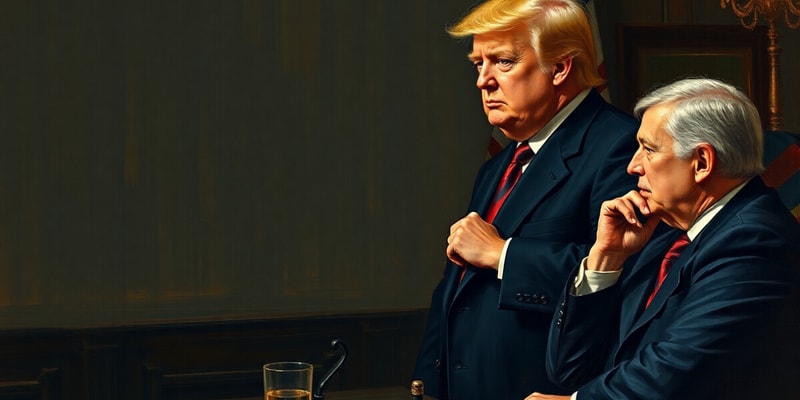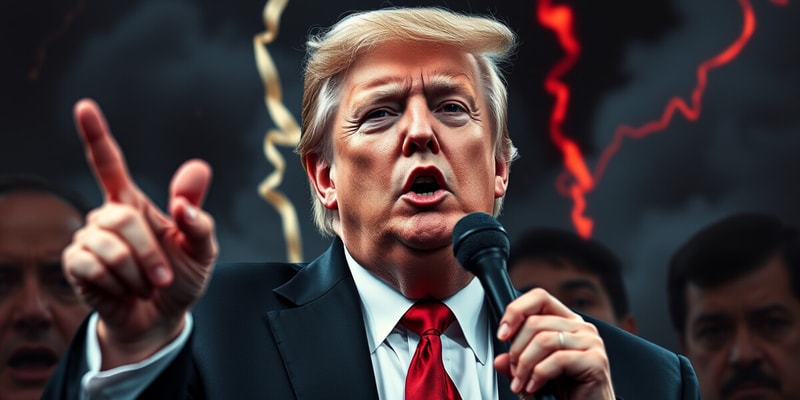Podcast
Questions and Answers
What were the charges brought against President Trump in his first impeachment?
What were the charges brought against President Trump in his first impeachment?
What was the outcome of the second impeachment trial of President Trump in the Senate?
What was the outcome of the second impeachment trial of President Trump in the Senate?
Which event triggered President Trump's second impeachment?
Which event triggered President Trump's second impeachment?
What historical context does the text provide regarding the frequency of presidential impeachments?
What historical context does the text provide regarding the frequency of presidential impeachments?
Signup and view all the answers
Which constitutional powers are designated to the President of the United States?
Which constitutional powers are designated to the President of the United States?
Signup and view all the answers
What is one of the president's powers related to the judiciary?
What is one of the president's powers related to the judiciary?
Signup and view all the answers
Which of the following actions can the president take regarding legislation?
Which of the following actions can the president take regarding legislation?
Signup and view all the answers
Who must approve the president's nominations for federal officials?
Who must approve the president's nominations for federal officials?
Signup and view all the answers
Which statement best describes the president’s power to pardon?
Which statement best describes the president’s power to pardon?
Signup and view all the answers
What action did George Washington take that helped establish the precedent for presidential advisory powers?
What action did George Washington take that helped establish the precedent for presidential advisory powers?
Signup and view all the answers
Which precedent did Thomas Jefferson set regarding the expansion of presidential powers?
Which precedent did Thomas Jefferson set regarding the expansion of presidential powers?
Signup and view all the answers
What principle was established by James Monroe's annual message in 1823?
What principle was established by James Monroe's annual message in 1823?
Signup and view all the answers
What notable action did Andrew Jackson take regarding the use of the presidential veto?
What notable action did Andrew Jackson take regarding the use of the presidential veto?
Signup and view all the answers
Which constitutional action did Lincoln take that related to military necessity during his presidency?
Which constitutional action did Lincoln take that related to military necessity during his presidency?
Signup and view all the answers
What concept, first asserted by George Washington, allows the president to withhold information from other branches of government?
What concept, first asserted by George Washington, allows the president to withhold information from other branches of government?
Signup and view all the answers
How did the presidency’s power evolve throughout the twentieth century?
How did the presidency’s power evolve throughout the twentieth century?
Signup and view all the answers
Which situation led to Andrew Johnson being impeached by the House of Representatives?
Which situation led to Andrew Johnson being impeached by the House of Representatives?
Signup and view all the answers
What is the main purpose of executive orders issued by presidents?
What is the main purpose of executive orders issued by presidents?
Signup and view all the answers
How do signing statements function in the legislative process?
How do signing statements function in the legislative process?
Signup and view all the answers
What role do executive agreements play in foreign policy?
What role do executive agreements play in foreign policy?
Signup and view all the answers
In what way have presidents expanded their war powers in recent history?
In what way have presidents expanded their war powers in recent history?
Signup and view all the answers
Which of the following actions may presidents take concerning budgetary powers?
Which of the following actions may presidents take concerning budgetary powers?
Signup and view all the answers
What is one significant limitation of executive orders?
What is one significant limitation of executive orders?
Signup and view all the answers
Who can the president choose without needing Senate approval?
Who can the president choose without needing Senate approval?
Signup and view all the answers
Study Notes
Presidential Impeachment
- Donald Trump was impeached twice by the House of Representatives; in 2019 for "abuse of power” and “obstruction of Congress” and in 2021 for "incitement of insurrection".
- Both times, although a majority of Senators supported the removal, the required supermajority was not attained.
- During the second Trump impeachment, a substantial number of Republican representatives and senators, such as Liz Cheney and Mitt Romney, sided with the Democrats.
- Following the 2021 impeachment attempts, federal investigations into the January 6th Capitol riot continue, and an attempt to establish an independent commission on the event, similar to the 9/11 investigation, was passed by the House, but blocked in the Senate.
- Though impeachment remains a rare event, the two impeachments of Trump and the single impeachment of Andrew Johnson in the 19th century mark a trend of its increased use in recent years.
Presidential Powers and Appointments
- The president is designated commander-in-chief of the armed forces, has the authority to negotiate treaties with the Senate's approval, and can receive foreign delegations.
- Presidents have broad power to pardon federal offenses, except for impeachment-related removals.
- The president submits information on the state of the country, can convene or adjourn Congress, and exercise veto powers (which can be overridden by a two-thirds majority in both houses of Congress).
- Presidents have the power to propose legislation and policy, request reports and opinions from department heads, and nominate federal judges and officials.
- Two-term presidents appoint roughly over three hundred federal judges during their tenure, and also appoint approximately five hundred top officials to the Executive Office, agencies, and commissions, all subject to Senate approval.
Evolution of Presidential Power
- George Washington set precedents by establishing a cabinet, which today comprises the heads of fifteen executive departments, and issuing a neutrality proclamation in 1793.
- Later presidents built upon these precedents by expanding their powers.
- John Adams led the United States in an undeclared war against France (1798-1800), known as the Quasi-War.
- Thomas Jefferson acquired the Louisiana Territory from France, justifying the action by arguing Congress's silence implied consent.
- James Monroe declared in his 1823 message, later known as the Monroe Doctrine, that European intervention in the Western Hemisphere would be considered an act of aggression.
- Andrew Jackson employed the veto extensively as a policy tool, using it more than all previous presidents combined, demonstrating a shift towards using the veto for policy disagreements rather than solely to protect presidential powers.
- James K. Polk significantly expanded presidential war powers by deliberately provoking Mexico over the border dispute, leading to the Mexican-American War of 1846.
- Abraham Lincoln, during the Civil War, used presidential war powers and arguments of military necessity to undermine the Confederacy.
- Lincoln suspended the writ of habeas corpus and issued the Emancipation Proclamation, a unilateral proclamation citing military necessity.
- Andrew Johnson's disagreements with Radical Republicans over Reconstruction policies led to his impeachment by the House of Representatives, but he was not removed from office.
- The broad interpretation of Article II's "executive power" has been used to justify presidential actions beyond those specifically listed in the Constitution.
- The expansion of the federal bureaucracy, including agencies like the Secret Service and the FBI, has augmented presidential power.
- Presidents have further developed the concept of executive privilege, claiming the right to withhold information from Congress, the judiciary, or the public.
- Executive privilege, though not explicitly mentioned in the Constitution, was first asserted by George Washington to limit scrutiny of the executive branch.
- The defense of executive privilege aims to ensure candid advice from presidential advisors and staff.
Presidential Expansion of Power
- Presidents have increasingly used executive orders, bypassing Congress; these orders have the force of law unless overturned by courts.
- Presidents have utilized signing statements, offering their interpretations of legislation when signing it, directing these statements to the implementing bureaucratic entity.
- In foreign policy, Congress has allowed the use of executive agreements in place of treaties.
- Recent presidents have broadened their definition of war powers to act unilaterally.
- Presidents, often with Congressional delegation of authority, lead budget framing, negotiation, and even impounding funds for policy goals.
Senate Confirmation Process
- The Senate has employed a strategy of "malign neglect" to stall confirmations by refusing to hold hearings
- In 2016, Senate Majority Leader Mitch McConnell refused to hold hearings on Merrick Garland, President Barack Obama's nominee for Supreme Court Justice after Associate Justice Antonin Scalia died
- Despite Garland's highly respected reputation and Senate confirmation to his previous position, McConnell cited the upcoming presidential election as a reason for delaying hearings
- After the election, Donald Trump's nominee, Neil Gorsuch, was confirmed using the "nuclear option," breaking a filibuster with a simple majority vote
- McConnell reversed his stance on election proximity when Justice Ruth Bader Ginsburg died before the 2020 election, quickly confirming Amy Coney Barrett
President’s Staff
- The President's staff is not subject to Senate approval, including the White House Chief of Staff, advisors, and political staff
- The Executive Office of the President was created by Franklin D. Roosevelt and includes several advisory bodies such as the Council of Economic Advisers, National Security Council, and OMB
- Presidents choose political advisors, speechwriters, and a press secretary to manage the administration's message and politics
- Presidential staff members work in the West Wing of the White House and serve at the pleasure of the president
- The White House staff has expanded significantly since Abraham Lincoln's administration with a recent report indicating over 450 employees
Studying That Suits You
Use AI to generate personalized quizzes and flashcards to suit your learning preferences.
Description
Explore the impeachments of Donald Trump in 2019 and 2021, examining the reasons, outcomes, and the political landscape surrounding these historic events. This quiz analyzes the implications of these impeachments on presidential powers and the responses from lawmakers. Dive into the intricacies of impeachment and its growing significance in modern politics.




